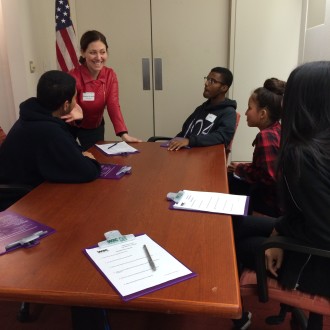
Picking up from yesterday –
I actually learned a lot about the rules for successful mediations, that I had no clue about before. Perhaps some of these could come in handy in day-to-day life.
Prescriptive words (such as “should”) shouldn’t be used. The process is all about asking questions – “What do you think would’ve made this situation better?” “What do you want to be able to move forward?” etc. – as opposed to, “You should have done [insert thing] to resolve the situation.
Also, if you declare something like “it seems like a misunderstanding,” that may be minimizing the problem for someone, making them feel unheard – even if you’re saying it to try to defuse the situation.
Also, the mediator teaching the high schoolers said not to use any blaming language during the talks or while writing out the agreement.
I could see how those were all good rules to try to get people to cooperate with the process.
Another thing I found interesting was the answer to the question, “Do I have to be here?” (if one of the parties being mediated asked).
You’re never supposed to make someone feel forced to do something… You just tell them their options. For example, “No, you don’t have to be here. You can be here, or you can go to the dean’s office, [or whatever choices the school offered].”
I think this might come in helpful with all sorts of people – even with myself. If I don’t necessarily feel like running on a certain day, or if I don’t feel like writing, or whatever – instead of forcing myself into one thing or another, just gently laying out options for myself.
But, I also think if you’re trying to help someone train for a marathon, or if you’re working with kids, or even co-workers, or perhaps if you’re just talking with a friend reluctant to apologize or do something else that’s probably ultimately good for her or his life – I just like the idea of, “No. You don’t have to do anything. The options are this, this, or this.”
It seems like common sense. Yet, obviously the phrase ‘because I said so’ exists, so this idea of explaining why we need to do certain things obviously doesn’t exist everywhere.
Another thing that I thought was interesting (though perhaps less applicable to normal life situations) is the idea that the mediator stressed that mediators are only supposed to be in control of the process, and the parties are in control of the agreement itself.
As a mediator, it’s only your job to facilitate communication. You shouldn’t be trying to push an agreement in one way or another.
Some interesting ideas, for sure.
This is where I’ll pick up tomorrow.